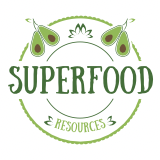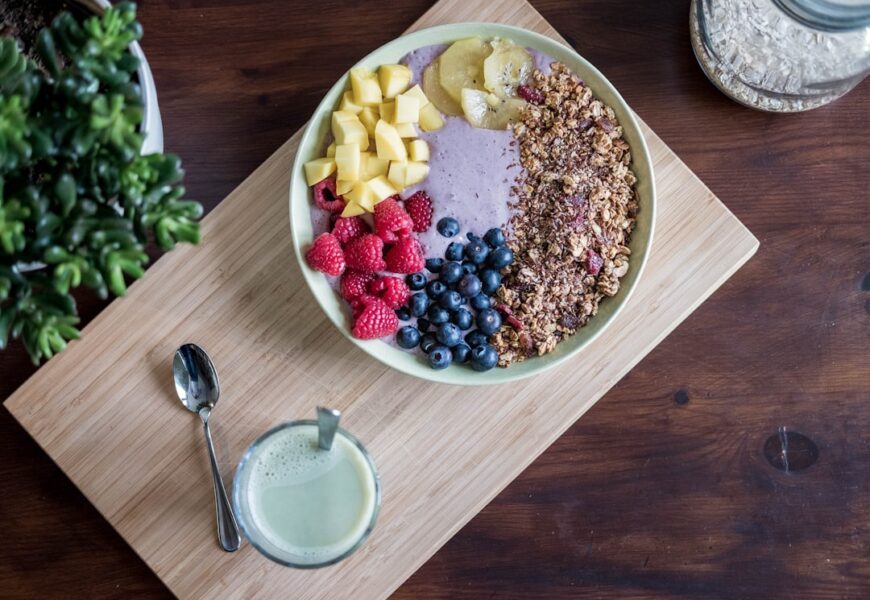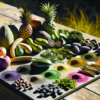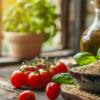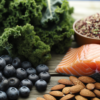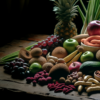A Beginner’s Guide to Superfood Products
Introduction
Welcome to the fascinating world of superfoods! If you’re just starting on your journey towards healthier eating, you’ve landed in the perfect spot. Superfoods aren’t just trendy; they’re packed with nutrients that can enhance your health, energy levels, and overall well-being. In this beginner’s guide, we’ll explore what makes certain foods “super,” dive into some must-try products, and provide tips on incorporating them into your daily diet. So, let’s get started and discover how these powerful foods can be part of your day-to-day life!
What are Superfoods?
 Image courtesy: Unsplash
Image courtesy: Unsplash
Definition and benefits
Superfoods refer to natural foods that are exceptionally high in vitamins, minerals, and antioxidants. These foods, loved for their dense nutritional profiles, offer numerous health benefits that go beyond those of regular dietary choices. Incorporating superfoods into your daily routine can lead to improved energy levels, enhanced immune function, and a decreased risk of chronic diseases such as heart disease and diabetes. They often contain antioxidants, which are crucial in fighting off free radicals, thereby reducing oxidative stress and preventing cell damage.
Importance of incorporating superfoods into your diet
Integrating superfoods into your diet can be a game-changer for your health and well-being. Given their nutrient-rich nature, superfoods can help fill nutritional gaps in your diet, ensuring you get the essential vitamins and minerals your body needs. They are particularly important in modern diets, which often lack sufficient nutrients due to processed foods and busy lifestyles. By boosting your nutrient intake, superfoods can contribute to improved mental clarity, better skin health, and overall increased vitality. A consistent diet rich in superfoods can also help manage weight, reduce inflammation, and support metabolic health.
Top Superfoods for Beginners
Blueberries
Blueberries are a powerhouse of antioxidants and one of the most accessible superfoods to start with. They are rich in vitamins C and K and manganese, playing a pivotal role in bone development and heart health. The antioxidants in blueberries, primarily anthocyanins, have been studied for their ability to enhance brain health and prevent cognitive decline. These small but mighty fruits are versatile and can be easily incorporated into various diets — from tossing them into a morning oatmeal or yogurt to blending them into a nutritious smoothie.
Quinoa
Quinoa is a fantastic gluten-free seed and serves as a great introduction to superfoods for beginners. Packed with protein, it includes all nine essential amino acids, making it a rare plant-based complete protein source. Quinoa is also rich in fiber, iron, magnesium, and manganese, making it beneficial for digestive health and blood sugar control. Its mild, nutty flavor and quick cooking time make it an excellent substitute for rice or pasta in meals, enhancing food’s nutritional value without sacrificing taste.
Spinach
Spinach is another superfood that is easy for beginners to incorporate due to its mild flavor and flexibility in recipes. It is loaded with nutrients including iron, magnesium, and vitamins A, C, and K, all of which are essential for maintaining healthy skin, strong bones, and proper muscle function. Spinach is also high in lutein, an antioxidant that can prevent vision problems. You can add spinach to smoothies, use it as a base for salads, or gently wilt it into soups and pastas, making it a simple yet powerful addition to any meal.
How to Incorporate Superfoods into Your Daily Meals
Introducing superfoods into your daily meals doesn’t have to be challenging or time-consuming. With a few creative ideas, you can seamlessly blend these nutrient powerhouses into your diet and elevate the health benefits of every meal.
Smoothie recipes
Smoothies are a fantastic way to kickstart your day with a burst of nutrients. Start with a base like almond milk, coconut water, or plain yogurt. Then, add a handful of leafy greens like spinach or kale for fiber and vitamins. Throw in some blueberries, strawberries, or a banana for a natural sweetness and antioxidant boost. To finish, boost the nutrient density with a tablespoon of chia seeds, flaxseeds, or a scoop of protein powder. Blend until smooth and enjoy a refreshing, energizing drink.
Salad ideas
Salads are versatile and can be a great vehicle for multiple superfoods. Begin with a base of mixed greens such as arugula, spinach, or baby kale. Top with colorful vegetables like beets, carrots, and bell peppers. For added texture and protein, incorporate nuts like almonds or walnuts and seeds such as pumpkin or sunflower. Don’t forget to add a superfood dressing by whisking together olive oil, lemon juice, and a touch of honey, or experiment with adding mashed avocado for creaminess.
Snack options
Snacking on superfoods can be both delicious and nutritious. For a quick and easy snack, mix together nuts, dried superfruits like goji berries or cranberries, and dark chocolate chips to create a homemade trail mix. Another option is spreading almond butter on apple slices or whole-grain crackers; almond butter is packed with protein and healthy fats. For something savory, roast chickpeas tossed in turmeric and black pepper in the oven for a crunchy, protein-rich snack.
Tips for Making the Most of Superfoods
To truly benefit from superfoods, it’s essential to consider how you select, store, and prepare them. Here are some tips to help you get the most out of these nutrient-packed foods.
Buying fresh vs. frozen
When buying superfoods, opting for fresh or frozen can depend on availability and intended use. Fresh superfoods are great for salads and smoothies where you want crisp textures and vibrant flavors. However, frozen options are often just as nutritious and can be more economical and convenient, especially for out-of-season items like berries or exotic fruits.
Organic vs. conventional
Choosing between organic and conventional superfoods can be a matter of personal preference and budget. Organic produce is grown without synthetic pesticides and fertilizers, which some people prefer to avoid. However, conventional superfoods still offer significant health benefits. Consider prioritizing organic options for those items known to have higher pesticide residues, like apples and berries.
Storing and prepping superfoods
Proper storage and preparation are key to preserving the nutrients in superfoods. Most fresh vegetables and fruits should be stored in the refrigerator to maintain their freshness. Nuts and seeds should be kept in airtight containers in a cool, dark place to prevent them from becoming rancid. When preparing superfoods, aim to maintain their nutrient value by avoiding overcooking; lightly steaming or sautéing is often best to retain their beneficial properties.
Superfood Products to Try
Chia Seeds
Chia seeds are tiny powerhouses of nutrition, known for their high fiber, protein, omega-3 fatty acids, and various micronutrients content. They are incredibly versatile in the kitchen and can be added to virtually any dish — from smoothies and yogurts to baked goods and salads. Just soaking them in water or any liquid will turn them into a gel-like substance, thanks to their high soluble fiber content. This unique property makes them excellent for thickening recipes and enhancing the feeling of fullness after meals, which can aid in weight management.
Spirulina Powder
Spirulina is a type of blue-green algae rich in protein, vitamins, minerals, and antioxidants. It is often sold in powdered form and has a distinct, somewhat aquatic flavor. Spirulina is particularly noted for its high content of vitamins B1, B2, and B3, iron, copper, and protein. It can be a beneficial supplement for vegans or vegetarians to help fill nutritional gaps. To incorporate spirulina into your diet, you can blend it into smoothies, shakes, or even sprinkle it into soups or on salads for a nutritional boost.
Acai Berry
Acai berries are best known for their deep purple color and are often marketed as a superfruit due to their high antioxidant content. These berries come from the acai palm tree native to the rainforests of South America. They are usually available outside their native land in a freeze-dried or powdered form, perfect for adding to smoothies, desserts, or granola bowls. Acai is rich in heart-healthy fats, fiber, and almost three dozen other nutrients and phytochemicals.
Potential Side Effects and Precautions
 Image courtesy: Unsplash
Image courtesy: Unsplash
Allergies and Sensitivities
While superfoods offer various health benefits, they can also cause allergic reactions or sensitivities in some individuals. Chia seeds, for instance, although rare, can cause problems for those who are prone to sesame or mustard seed allergies. Similarly, spirulina might be contaminated with microcystins, which can be harmful, so always ensure that you buy from a reputable source. It is essential to start with small amounts when trying new superfoods and observe how your body reacts.
Interactions with Medications
Many superfoods have potent biological effects and may interact with prescription medications. For example, the high vitamin K content in spirulina could potentially interfere with blood-thinning medications like warfarin. It’s important to discuss with your healthcare provider before incorporating substantial amounts of superfood products into your diet if you are taking prescribed medication.
Moderation and Balanced Diet
As beneficial as superfoods are, they are not a cure-all and should be consumed as part of a balanced diet. Over-relying on superfoods can lead to nutritional imbalances and health issues. Focus on incorporating a variety of foods in your diet to ensure you receive a broad range of nutrients. Remember that no single food can provide all the nutrients your body needs. Incorporating a diverse array of fruits, vegetables, grains, and protein sources is crucial for maintaining optimal health.
Conclusion
Superfoods are not just a trend, they are staples for a nutrient-rich diet that can enhance your overall health. By incorporating foods like blueberries, spinach, and almonds into your daily routine, you can reap the benefits of vitamins, minerals, antioxidants, and other vital nutrients these power-packed items have to offer. Remember, the key to a balanced diet is variety, so feel free to explore and introduce different superfoods to your meals and snacks. Start small, stay consistent, and enjoy your journey to a healthier lifestyle!
